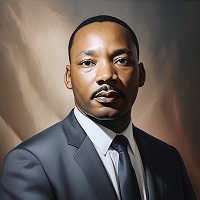

Quotes By Martin Luther King Jr.

Leader
Martin Luther King Jr.
Jan 15, 1929 - Apr 04, 1968
At the beginning of 1963, nine years after this historic decision, approximately 9 percent of southern Negro students were attending integrated schools. If this pace were maintained, it would be the year 2054 before integration in southern schools would be a reality.
It is a simple matter of justice that America, in dealing creatively with the task of raising the Negro from backwardness, should also be rescuing a large stratum of the forgotten white poor.
A Bill of Rights for the Disadvantaged could mark the rise of a new era, in which the full resources of the society would be used to attack the tenacious poverty which so paradoxically exists in the midst of plenty.
Rationalization and the incessant search for scapegoats are the psychological cataracts that blind us to our individual and collective sins. But the day has passed for bland euphemisms. He who lives with untruth lives in spiritual slavery.
The children understood the stakes they were fighting for. I think of one teenage boy whose father's devotion to the movement turned sour when he learned that his son had pledged himself to become a demonstrator. The father forbade his son to participate. "Daddy," the boy said, "I don't want to disobey you, but I have made my pledge. If you try to keep me home, I will sneak off. If you think I deserve to be punished for that, I'll just have to take the punishment. For, you see, I'm not doing this only because I want to be free. I'm doing it also because I want freedom for you and Mama, and I want it to come before you die." That father thought again, and gave his son his blessing.
The history books, which have almost completely ignored the contribution of the Negro in American history, have only served to intensify the Negroes' sense of worthlessness and to augment the anachronistic doctrine of white supremacy.
Urban riots must now be recognized as durable social phenomena. They may be deplored, but they are there and should be understood. Urban riots are a special form of violence. They are not insurrections. The rioters are not seeking to seize territory or to attain control of institutions. They are mainly intended to shock the white community. They are a distorted form of social protest.
I've been in many demonstrations all across the South, but I can say that I had never seen, even in Mississippi, mobs as hostile and as hate-filled as in Chicago. When we had our open housing marches many of our white liberal friends cried out in horror and dismay: "You are creating hatred and hostility in the white communities in which you are marching. You are only developing a white backlash." They failed to realize that the hatred and the hostilities were already latently or subconsciously present.
In deep disappointment I have wept over the laxity of the church. But be assured that my tears have been tears of love. There can be no deep disappointment where there is not deep love.
Within the white majority there exists a substantial group who cherish democratic principles above privilege and who have demonstrated a will to fight side by side with the Negro against injustice. Another and more substantial group is composed of those having common needs with the Negro and who will benefit equally with him in the achievement of social progress.
Unfortunately, when hope diminishes, the hate is often turned most bitterly toward those who originally built up the hope. In all the speaking that I have done in the United States before varied audiences, including some hostile whites, the only time that I have been booed was one night in a Chicago mass meeting by some young members of the Black Power movement.
With the ending of physical slavery after the Civil War, new devices were found to "keep the Negro in his place." It would take volumes to describe these methods, extending from birth in jim-crow hospitals through burial in jim-crow sections of cemeteries. They are too well known to require a catalogue here.
The subtle, psychological technique of the North has approached in its ugliness and victimization of the Negro the outright terror and open brutality of the South. The result has been a demeanor that passed for patience in the eyes of the white man, but covered a powerful impatience in the heart of the Negro.
The Negro had never really been patient in the pure sense of the word. The posture of silent waiting was forced upon him psychologically because he was shackled physically.
The American people are infected with racism-that is the peril. Paradoxically, they are also infected with democratic ideals-that is the hope.
To end poverty, to extirpate prejudice, to free a tormented conscience, to make a tomorrow of justice, fair play, and creativity-all these are worthy of the American ideal.
Negroes hold only one key to the double lock of peaceful change. The other is in the hands of the white community.
It is understandable that the white community should fear the outbreak of riots. They are indefensible as weapons of struggle, and Negroes must sympathize with whites who feel menaced by them. Indeed, Negroes are themselves no less menaced, and those living in the ghetto always suffer most directly from the destructive turbulence of a riot.
Among the many vital jobs to be done, the nation must not only radically readjust its attitude toward the Negro in the compelling present, but must incorporate in its planning some compensatory consideration for the handicaps he has inherited from the past.
Deep in our history of struggle for freedom, Canada was the North star.
Popular Authors









